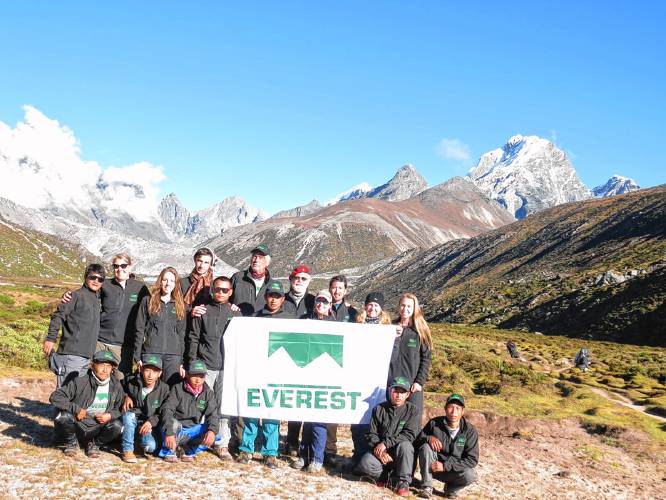As the group of nine New Hampshire residents neared the Mount Everest base camp, the air was thin. Every movement took more effort than usual.
It’s a small taste of what life is like for Gus Dreher of Peterborough.
Gus has Duchenne muscular dystrophy, a degenerative genetic disorder that can be carried by females but almost exclusively manifests itself in men. While the life expectancy for men and boys with DMD is increasing, the majority still die in their 20s.
“It was very challenging, just walking,” said Maxine Dunn, 22, of Peterborough, who was one of the group that made the ascent in a fundraiser for Hope for Gus, a foundation started by Gus’ parents that raises funds for Duchenne research. Even before the trek began, she said, she was feeling the effects of the higher altitude. “It was immediately more difficult to breathe, and that’s the sort of thing that we can’t prepare for,” said Dunn. “Every day waking up, we’d be out of breath. Things that you do normally, like rolling up your sleeping bag, it’s all harder.”
That is the point of the Everest to End Duchenne fundraiser, said Tonya Dreher, Gus’ mother and director of Hope for Gus. The hike serves as a reminder of the difficulties faced by someone with Duchenne on a daily basis.
Though the trip would be impossible to make for someone with Duchenne, the group carried with them a string of flags, each carrying the name of someone with Duchenne, which they read out once they had reached base camp.
“That feels so good,” said Dreher. “Because you know that people all over the world have sent their kid’s names.”
“It was a big reminder of why we did all this crazy hard work,” said Dunn.
And, said Dunn, it weighed heavily on her mind when she was descending from base camp, and the decreasing altitude made each day a little easier.
“That doesn’t happen for Gus,” she said.
The hike was originally meant to be a one-time fundraiser done in 2015, said Dreher, but it was the most successful fundraiser ever done by the Hope for Gus foundation, so it was resurrected for this year, and another trip in 2019 is already in the works.
This year’s trip netted $50,000 in donations from people who sponsored the nine participants. That number was matched by Hope for Gus, totaling $100,000 which will be donated to research on a gene therapy that is currently being developed.
“It’s the most exciting thing in Duchenne research right now,” said Dreher.
Gene altering technology is a hopeful prospect for those with genetic disorders – any genetic disorder, not just Duchenne – said Dreher, because it has the potential to halt the disorder, rather than treat its symptoms.


